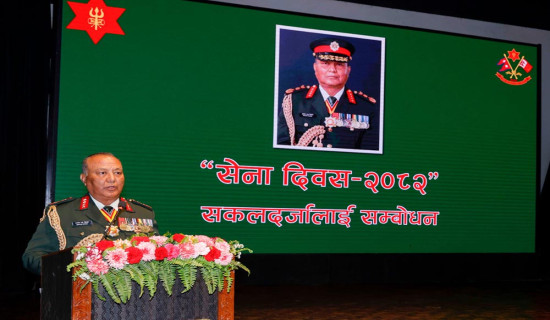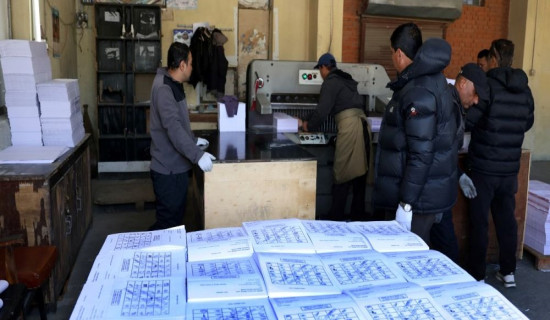- Saturday, 14 February 2026
Civil Service Needs Sweeping Reforms
A serious discussion on long pending Civil Service Bill 2024 seems to have picked up now. The lawmakers and civil servants unions have riveted their attention to thrash out the much critiqued issue relating to trade unionism that has pervaded and stalked the civil service organisation in the country. It is no mere coincidence that the lawmakers across the political divides and public administration experts as well have called unanimously for cleaning the civil bureaucracy and bar the political parties to fragment the civil servants through politicised bureaucracy aligned to partisan groups. Though civil servants have stood together to resist the call, the lawmakers reportedly seem determined to give a stronger push to clear the civil bureaucracy of the partisan groups which have fragmented and polarised the civil servants along the partisan orientation.
Since the NC and CPN (UML) have been the chief constituents of the incumbent coalition government, these two major parties are in a position to ensure that the Bill long shelved in the House of Representatives (HoR) reflects the contemporary needs and demands of the public administration and management in the country. Moreover, as these coalition partners have the major hold in the civil bureaucracy in terms of the union composition and their strength, they can coax the civil servants into acquitting the civil administration of partisan interference. As reported in the media, subjects like age-bar for retirement from civil service, organisation and accountability of the civil servants according to the constitutional spirit have been other issues that have brewed controversies.
O & M survey
In order to understand the issues related to federal reorganisation of the civil service, it is necessary to talk about some steps that were taken to restructure bureaucracy following the promulgation of the federal constitution in 2015. In order to enable that the civil servants working under the purview of the centralised unitary system be disaggregated and reorganised in line with structures of the federal state, the Organisation and Management (O & M) Survey was carried out and the organisational structure and strength of employees for three levels of governments was more or less defined. The Employees Adjustment Act, 2018 was enacted in accordance to the constitutional provision of integrating employees into the federal, provincial and local government frameworks.
It took the federal government nearly a year after its formation following the election in 2017 to pass the Employees Adjustment Act. This procrastination had an effect on important provincial and local government tasks like law making and the implementation of policies and programmes at the sub-national level. However, the problematic issue that has delayed the process of parliamentary enactment is what is generally known as increased blurring of demarcation between politics (rajniti) and civil administration (nijamati prasashan). This has turned out to be a contentious issue in Nepal where federalism has been implemented without a well-thought out strategy and effective administrative reorganization in line with the constitutional and governing principles of the federal polity.
Nepal has continued with the unified system of bureaucratic organisation with the central government keeping the unqualified authority in recruiting, deploying, rewarding and punishing civil servants across the tiers. Today, province (Pradesh) and local level key bureaucrats are recruited and administered from the Ministry of Federal Affairs and General Administration without any consultation with and concurrence of the state (Pradesh) and local governments. This has infringed upon the self-rule and shared rule principle of federalism. In fact, both state (Pradesh) and local government should be practically enabled to exercise authority and autonomous space to set terms to hire and retrench the civil servants to work under their respective purview.
The civil servants are seemingly in favour of continuing their administrative control and answerability to the central agencies which they perceive will safeguard their perennial interests. Nepal's federalisation process has hit snags especially due to the issues related with the administrative devolution and personnel management. As the several functions that used to be planned and implemented at the central level have been constitutionally assigned to the provinces and local governments under federal arrangement, sub-national capacity to implement newly devolved functions needs to be enhanced. This capacity can be bolstered only if the adequacy of trained and competent personnel, among others, are provided under the purview of the sub-national government.
Bloated volume
However, contrary to the spirit of the federalism, the bloated volume of the civil bureaucracy to the tune of forty five thousand is being retained with the federal government at the centre. Since the constitution limits the number of ministries and departments at the federal level, the size of bureaucracy will have to be thoroughly downsised through the fresh organisation and management survey but it appears that it is not going to take place. The top heavy bureaucratic structures is being kept without being reorganised. The elite personnel embedded at the central bureaucracy have often been found resisting to join in to work under the purview of sub-national government.
On the contrary, as mentioned above, the bureaucracy is beholden to party politics and fragmented along the partisan lines. The civil bureaucracy is swallowing a bigger chunk of the national revenue indicated by ever growing size of the recurring expenditure. Even then it has failed miserably to perform minimally consistent to the expectations of the people. Unless bureaucracy is made result-oriented and citizen-centric, the devolved structural and functional arrangements at province and local level will make no sense for the common people. It is expected that the federal government shall take these aspects into consideration and enact the civil service law immediately to address the requirements for professionalised, federalised and competent, citizen-centric civil service in Nepal.
(Rijal, PhD, contributes regularly to TRN and writes on contemporary political, economic and governance issues. rijalmukti@gmail.com)
















